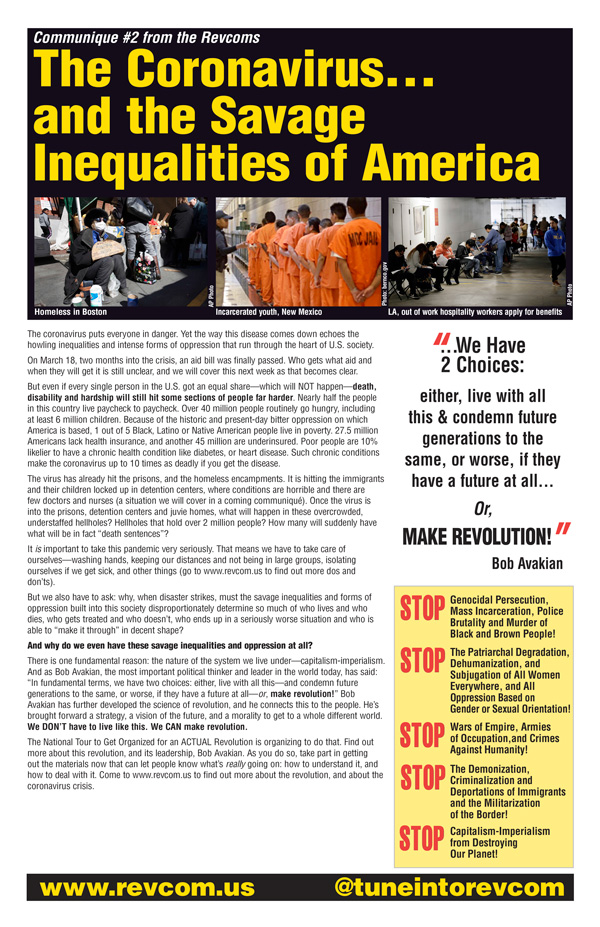Check It Out
New Yorker Interviews Doctor at Rikers Island Prison as Coronavirus Hits: Horror on Top of Horror at America’s Hellholes
| revcom.us
From a reader:
What will happen when the coronavirus hits the overcrowded prisons and jails of America, a country which incarcerates more people than any other country in the world?
Actually, the virus has already hit these hellholes. An interview that New Yorker magazine’s Jennifer Gonnerman did with Rachael Bedard, a medical doctor at New York City’s Rikers Island jail, gives a chilling sense of the horrors that are just beginning to unfold in this country’s prisons and jails (“A Rikers Island Doctor Speaks Out to Save Her Elderly Patients from the Coronavirus,” March 20). As of March 20, it was reported that there were already 21 people jailed at Rikers who have tested positive for the coronavirus, along with 12 jail employees and 5 health workers.
Until a couple of years ago, Rikers Island held up to 10,000 people daily, the majority of whom were Black and Latino people (mostly men) from low-income neighborhoods. Some 85 percent of them had not been convicted of any crimes but were held behind bars—for weeks, months, or even years—awaiting trial, usually because they were not able to pay bail. Widespread exposure, outrage and protest about the brutality and dehumanizing conditions at Rikers forced the city authorities to announce they would eventually close down the jail. But 5,400 people a day on average are still jailed at Rikers. And those incarcerated at Rikers are still overwhelmingly Black and Latino.
Dr. Bedard points out that “like a nursing home, there were already two positive cases of the COVID-19 among those held at Rikers. The doctor points out that “like a nursing home, a jail is a perfect setup for an outbreak.” In particular, at Rikers, “picture those five thousand four hundred people all living in congregate settings, either dormitories of forty men, beds three and a half feet apart, or cell blocks where everybody is sharing one common space, one common hallway. These spaces are locked. These guys have absolutely no freedom of movement.”
And then there are all the jail personnel—the workers dealing with food, the medical staff, and others. At the time of the interview, Dr. Bedard herself had a fever and shortness of breath (which are among the symptoms of COVID-19, the disease caused by the coronavirus)—but had not yet been tested for the virus.
Dr. Bedard is a geriatrician, so she takes care of older patients. She points out that contrary to common perception, a significant number of people in prisons and jails are older people. At Rikers, there are more than 900 incarcerated people aged 50 and over. And older people are more vulnerable to COVID-19. Dr. Bedard says she currently has multiple patients in their 80s, and one in his 90s, with various serious health issues—including those who are A.D.L.-impaired, meaning “they cannot attend to their own activities of daily living and would be nursing-home- or assisted-living-eligible if they were in the community—who need daily assistance with really basic tasks like toileting and changing themselves.”
What kind of a criminal system puts people like this behind bars in the first place—and then keeps them locked up in such dangerous conditions even as a deadly pandemic spreads?!
Deeply alarmed by this situation at Rikers and other jails and prisons, Dr. Bedard and some of her colleagues have been speaking out publicly about the need for drastic action. She wrote on Twitter, “We need to take the unprecedented step TODAY of providing urgent release to everyone in the jails who is at risk of serious morbidity and mortality from COVID.” A group of Rikers inmates issued a statement saying they were refusing to leave their dorms in protest of the crowded conditions and lack of personal protective equipment and cleaning supplies provided to them. And they demanded that all imates over 50, incarcerated for parole violations, with high-risk health conditions, and with less than a year of sentenced time “BE IMMEDIATELY RELEASED.” The chief medical officer at Rikers, Dr. Ross MacDonald, also tweeted a challenge to “judges and prosecutors in New York” that “A storm is coming ... Please let out as many as possible.”
As of March 19, as the number of COVID-19 cases and deaths continued to spike up sharply in New York City and elsewhere, NYC Mayor de Blasio announced he planned to release 40 “coronavirus-prone inmates” from Rikers—a shockingly paltry number. And as bad as the situation at Rikers is with 5,400 people locked up, multiply the horror of what the interview with Dr. Bedard reveals many times over when considering the U.S. as a whole. This is a country that incarcerates over two million people—in over 1,800 state and federal prisons, 3,100+ local jails, and many “detention facilities,” juvenile prisons, military prisons, etc.
This horrible situation at Rikers is an example of what Communique #2 from the Revcoms says: “The coronavirus puts everyone in danger. Yet the way this disease comes down echoes the howling inequalities and intense forms of oppression that run through the heart of U.S. society.”
Check out the whole interview with Dr. Bedard, available online here.

5,400 people a day are jailed at Rikers Island, NY, overwhelmingly poor Black and Latino men who couldn't post bail, and many of them older people with serious health problems. What kind of a criminal system puts people like these behind bars in the first place—and then keeps them locked up in such dangerous conditions even as a deadly pandemic like COVID-19 spreads?!
Photo: AP
Click here to Read and Download
The Coronavirus Pandemic
— A Resource Page
Including:
- Revcom Communiques
- Interview with Lenny Wolff
- An Overall Orientation: Thoughts from a Reader
- Frequently Asked Questions

Model of the coronavirus that causes COVID-19 disease.
Get a free email subscription to revcom.us:


